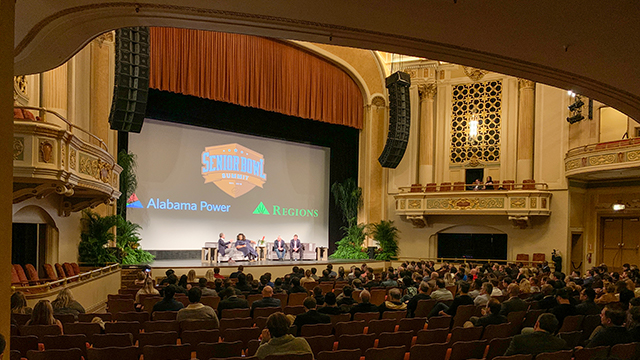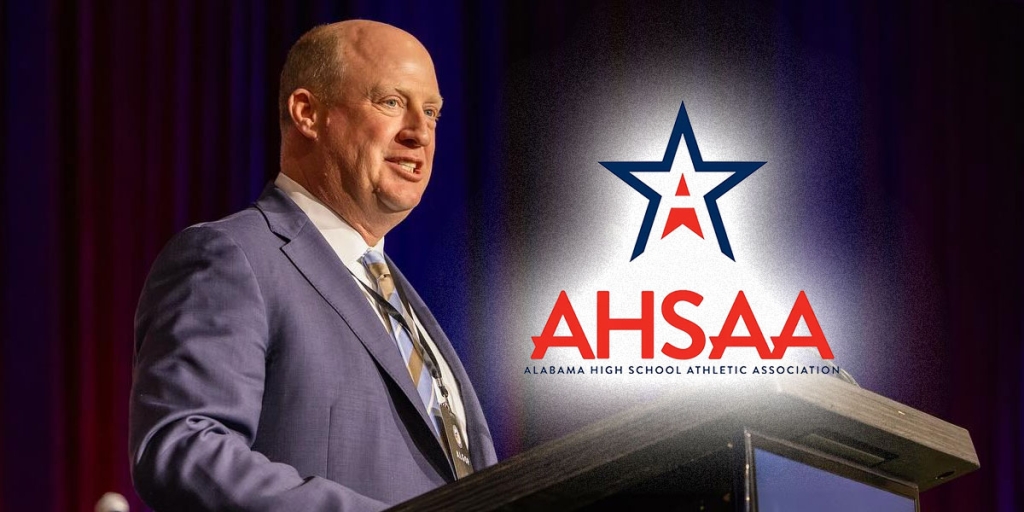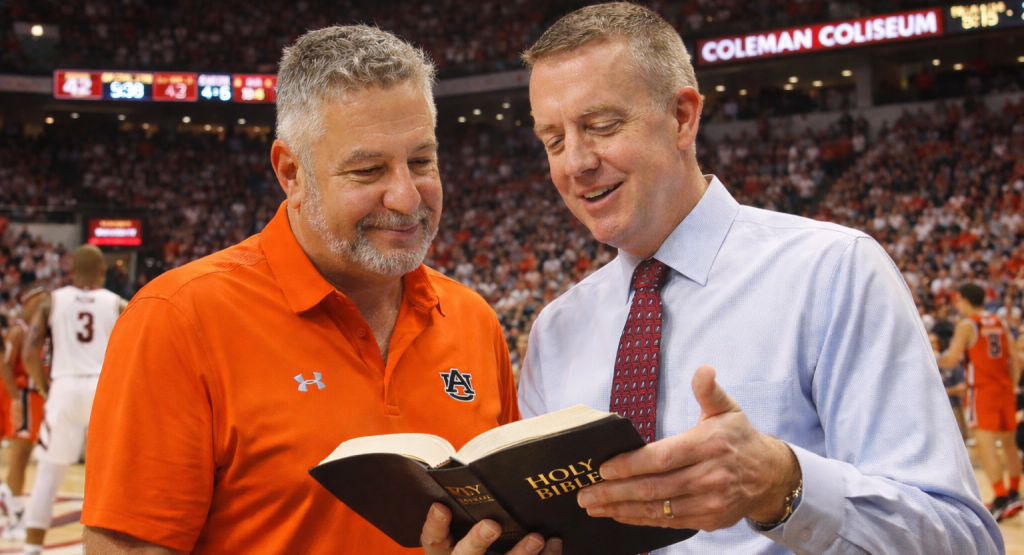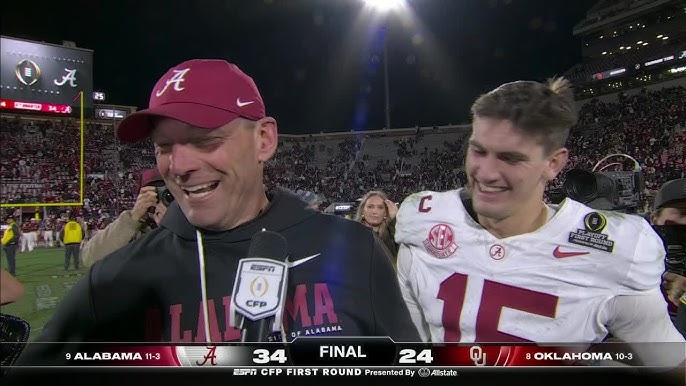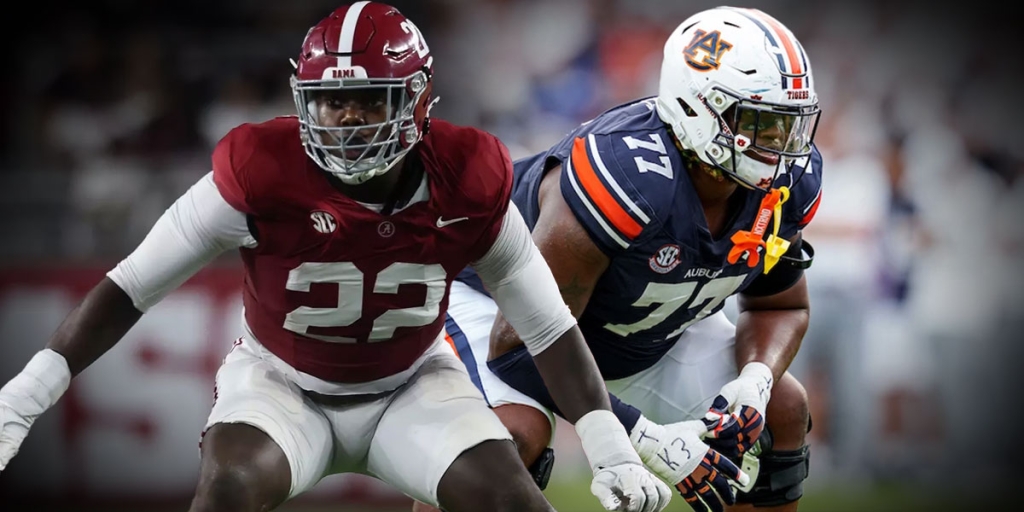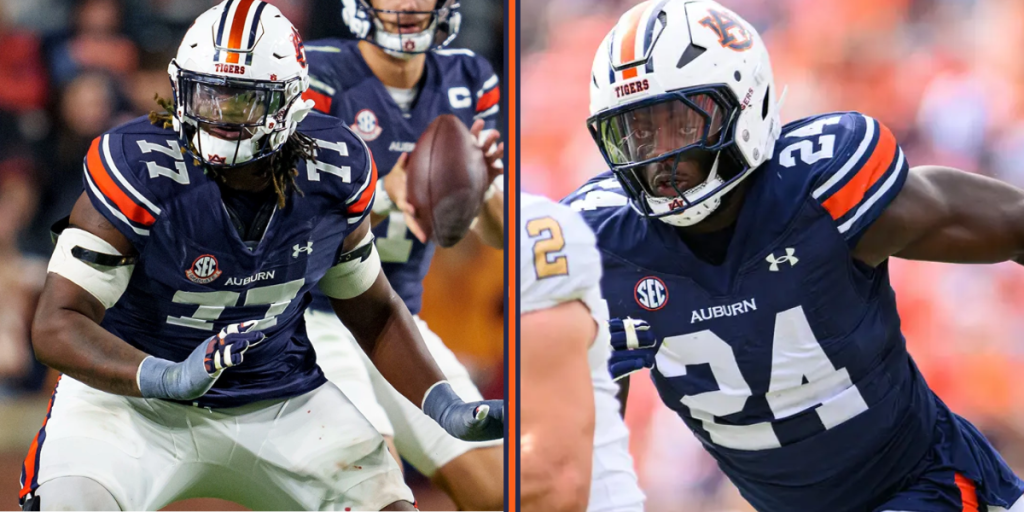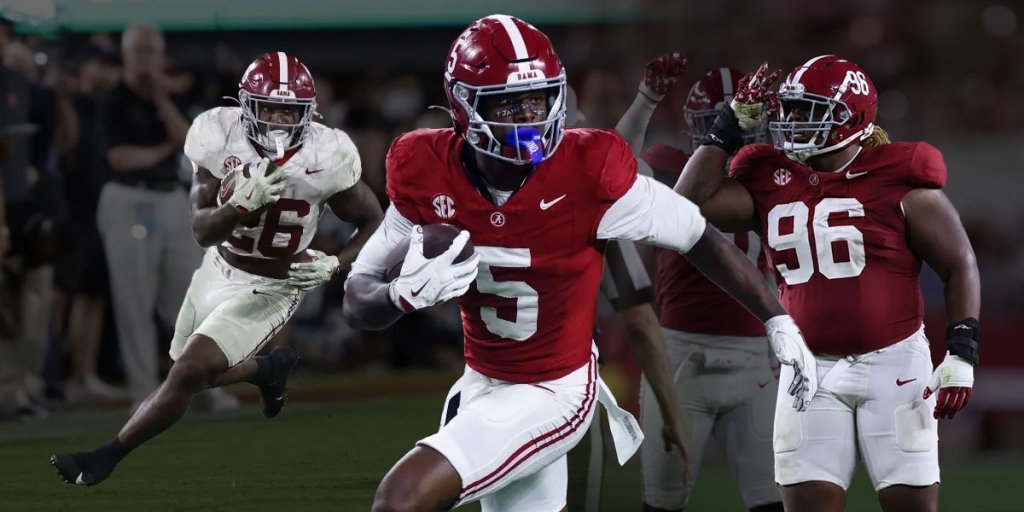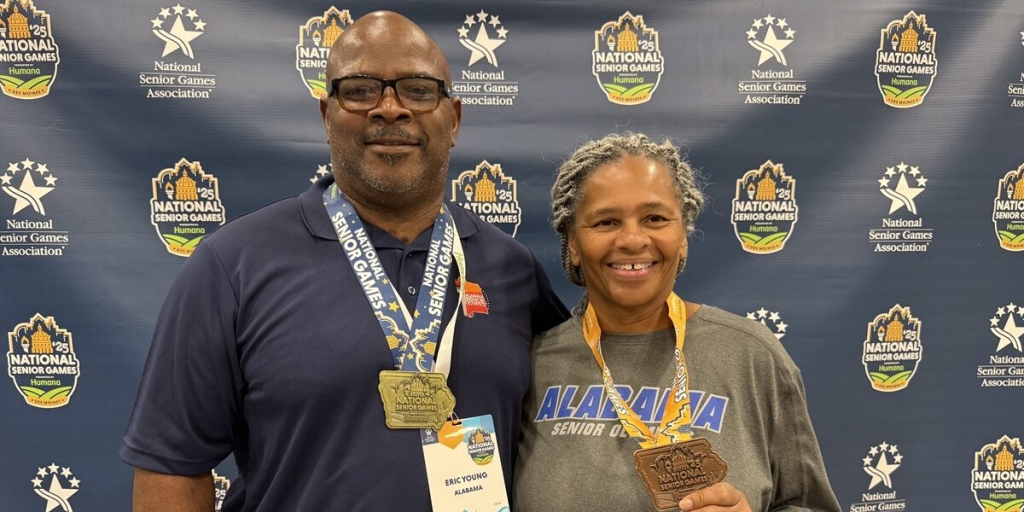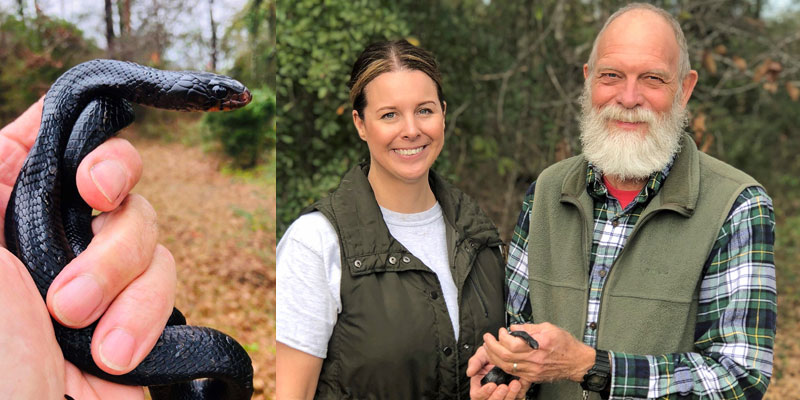Breaking barriers, building culture and growing business were key themes discussed Thursday during the second annual Senior Bowl Summit at Saenger Theatre in downtown Mobile.
Entrepreneur Gary Vaynerchuk was the keynote speaker. He urged the hundreds of people in attendance to overcome fear of judgment, a fear he says discourages 99 percent of people from taking a risk.
“Most of you won’t post on social media because there is insecurity about what you’re going to say,” Vaynerchuk said. “You worry about what people will say about you. The only thing you can do wrong is not be yourself.”
Vaynerchuk encouraged attendees to embrace the internet, posting content seven to 25 times per day on three to seven social media platforms.
“What are you waiting for?” Vaynerchuk said. “If you are not communicating, you do not exist. Communicate about what you love.”
The event, sponsored by Alabama Power and Regions Bank, was moderated by Jeremy Schaap of ESPN‘s “Outside the Lines.” Schapp moderated four panel discussions related to sports leadership, women in sports, sports agents and head coaches.
Sports business
The first panel discussion centered on the business of sports and included comments from Peter McLoughlin, CEO of Vulcan Sports & Entertainment; John Maitrejean, director of marketing operations and partnerships at The Hershey Company; and Sandra Richards, managing director for Morgan Stanley Global Sports & Entertainment. McLoughlin, who is the former president of the Seattle Seahawks, said he’s bullish on the future of the sports industry.
“It’s what stands out in the crowd,” McLoughlin said. “Sports is true reality television. It’s the best way for marketers and companies to connect with the fans.”
Maitrejean said his company does a lot of research to make sure sponsorships fit the product.
“Our job is to make sure we are partnered with the right teams,” Maitrejean said. “Sports still gets a lot of eyeballs because it’s a live event, and a lot of our fans are also big sports fans, but with the fragmentation of media, we have many more choices.”
Richards, who advises athletes and entertainers on managing newfound income, says the business has dramatically changed the past 10 years.
“The athletes are now a business themselves,” Richards said. “Everything is different than it was yesterday.”
Richards said she encourages people planning for their future to start with “why.”
“What’s you’re why?” Richards said. “What’s your goal? Is it going to get you to the retirement place you want to be? The decisions today are going to have a big impact on what happens tomorrow.”
McLoughlin said the key to any successful business is communication.
“Communicate, communicate, communicate,” McLoughlin said. “Communicate your goals and the culture. Ask the employees to share that with customers and staff. As long as you have good people and are aligned with the goals, you will be successful.”
Maitrejean added, “If you’re a small business owner, make sure you understand the value and differentiation your product offers and continue to differentiate yourself from your competitors. The successful brands are the ones who do this. Having that right branding brings you longevity.”
Women in sports
The second panel discussion focused on the growing role of women in sports. Panelists were Buffy Filippell, president and founder of Teamwork Online; sports agent Nicole Lynn; National Football League (NFL) official LaShell Nelson; and Catherine Raiche, football operations and player personnel coordinator for the Philadelphia Eagles. All the panelists talked about the challenges they face because of their gender.
“There are certain things I can’t do that my peer agents (men) can do,” Lynn said. “They can take clients to dinner and the bar at night. I can’t do that. I have to do coffee at 4.”
Nelson said she has to work harder than male officials to remove doubts about her ability.
“I have to watch way more film because I don’t ever want anyone to doubt me,” Nelson said. “You have to take it beyond what the normal male would do.”
Raiche said she spends extra time preparing for meetings because the validity of her statements has occasionally been dismissed because of her gender.
“Every time I walk into a meeting I always do the extra work to verify and confirm to be 2,000% ready,” Raiche said. “I do it because it’s my work ethic but also because I’m a woman. My preparation needs to be stronger.”
Filippell, who recruits executives for jobs in sports, said employers in the sports business are making great strides drawing women into the industry.
“Gender equality is growing the businesses,” Filippell said. “Most of the teams want to have gender equality because their audience is diverse, so you need to have those voices in the organization that is diverse.”
The panelists encouraged attendees to find a mentor or sponsor to give them honest encouragement and feedback.
“Get you an advocate that is going to be very honest with you,” Nelson said. “I want that because if they don’t give it to you, they don’t care. Find someone that is the best at their job and will help you.”
“Find a sponsor that doesn’t look like you,” added Lynn. “If I sponsor someone that looks like me, it looks like I’m sponsoring them because of that. Excellence is your greatest currency.”
Added Raiche, “Block the noise. Focus on what your goal is. Put your head down and work. Don’t wait for someone to look like you to do it. Just do it.”
Sports agents
The third panel featured three sports agents: Drew Rosenhaus, Ryan Tollner and Ryan Williams. All three discussed the challenges of their careers.
“When I was 22, I was Mr. Miami Vice,” Rosenhaus said. “I would hang with them, go to clubs with them. Now I’m like their dad. It’s less of a friendship, buddy-buddy, and more of a respect type of relationship.”
“It used to be very transactional,” Tollner added. “Now it’s entirely relational. We are on call all of the time. That’s just a very different demand. You have to be really good at prioritizing your time and be there for the player at the critical times.”
Williams said the hyper-competitive nature of the sports industry, especially in this age of social media, has forced agents to also be therapists.
“Athletes either succeed or fail every Sunday,” Williams said. “These guys are human. We end up being therapists. The contract defines the term, but we get in the mud to help our clients.”
All three panelists said recruiting is the most difficult part of their job.
“Every single year I have to to try to get remarried to someone … all while 900 agents are doing the same thing,” Williams said. “We take our losses harder than we celebrate our wins, much like our clients. The rest is fun.”
Rosenhaus said the fact that the player may not be the decision-maker adds additional frustrations.
“You could beat out a hundred people and be No. 2, and get nothing,” Rosenhaus said. “There’s no consolation prize. It is a brutal process where you can work dozens of hours and give up countless trips away from your family, and never have a chance of getting that player. You have to have a lot of poise. You can’t say anything and tell him he’s a jerk.”
Tollner said the unpredictable income and frequent travel are tough on family.
“It’s a very hard job to stabilize an income,” Tollner said. “I travel a lot. It’s extremely demanding on a family.”
Professional coaching
The final panel was a discussion with Detroit Lions head coach Matt Patricia and Cincinnati Bengals head coach Zac Taylor. Schapp asked them about the challenges of coaching players who are constantly distracted by conversations and content on their phones. Taylor said he doesn’t try to stop them but does encourage them to develop relationships.
“We don’t try to cut that off because they are attached to their phones,” Taylor said. “We just want guys to develop relationships and build culture. Find other moments throughout the day where you can connect.”
Patricia added, “I’ll walk down the hall and tell people to put their phone down and talk. It’s amazing what you can do when you actually interact with each other. It’s amazing to see that relationship grow.”
Patricia said the roller coaster of emotions caused by social media posts has forced him and his coaches to mentally assist players.
“Guys get wrapped up in that social media and they don’t know where to go with it,” Patricia said. “We help them in a positive way and educate them on how to get out of a bad situation on social media.”
Taylor said he and his coaches also encourage players to think before they tweet.
“We’re not telling the guys to not tweet,” Taylor said. “We just tell our guys to protect the team.”
Taylor and Patricia and their coaching staffs will lead Saturday’s 71st annual Reese’s Senior Bowl. The game, played at Ladd-Peebles Stadium in Mobile, is the nation’s only college all-star game coached by entire staffs from two NFL clubs. For more information, visit seniorbowl.com.
(Courtesy of Alabama NewsCenter)




